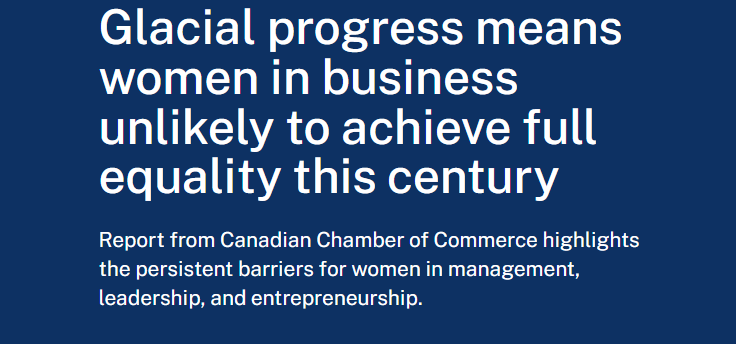The Slow Stride of Progress for Women in Business Leadership and Entrepreneurship
The Canadian Chamber of Commerce released a new report Tuesday showing that while Canada has made some positive strides in advancing equality for women in business, there is much work to be done if we are to achieve the success seen in other countries around the world.
The report "Barely Breaking Ground: The Slow Stride of Progress for Women in Business Leadership and Entrepreneurship" analyzes the significant representation and compensation gaps between men and women in management occupations and the unique challenges women entrepreneurs face.
Women in Canada face not one glass ceiling but several, and not one broken rung in the promotion ladder but many—all of which hinder their ascent to full equality.
While women have made gains in overall employment, rising from 43 per cent of total jobs in 1987 to 48 per cent in 2023, they fare worse in senior-ranking positions. In 2023, the share of women across all management occupations, which includes middle managers, was only 35 per cent; this share falls to 30 per cent for senior managers, and less than 25 per cent in the boardrooms of corporate Canada. If current trends persist, national parity will not be achieved within this century.
The knock-on effects of limited progress for women extend beyond traditional workplaces.
The good news is that women’s wages have grown faster than men’s in recent decades, however, notable compensation gaps remain. In 2023, women earned less than men—88 cents to the dollar in management occupations, up from only 80 cents in 1997.
Looking across Canada, there are some bright spots, with women having achieved parity in representation in six of the 19 management occupations analyzed, with the strongest showing in healthcare and education, although major gaps remain in natural resources and construction. In Prince Edward Island, women earn more than men in management occupations, and in Quebec, women are closing in on pay parity. Conversely, women in Alberta have the farthest to go.
Awareness of the importance of these issues is clearly building across society. Now is the time to take the next steps to invest in women and accelerate progress.
There are recommendations on what we can do. Canadian businesses, non-profits, governments and public sector employers all have a role to play in bridging the representation and compensation gap still experienced by women today.
- Recruit: examine job descriptions and track outcomes
- Retain: mentorship, upskilling, review classifications
- Promote: recognize and reward, hold leaders accountable
- Lead by example: public sector as leaders
- Address gaps: alter lending practices, improve funding
About the Report Author
Marwa Abdou, the report’s lead author, is a Senior Research Director with the Canadian Chamber of Commerce’s Business Data Lab.
Read the summary from the Canadian Chamber of Commerce and the full report available at the Business Data Lab.


